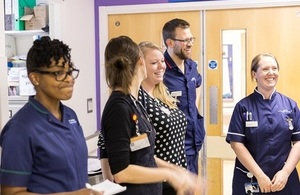Deputy Minister of Health, Director General of the Ghana Health Service and Directors of the Ghana Health Service here present, Chief Executive Officer of the Mental Health Authority, Executive Director of the Christian Health Association of Ghana (CHAG), BasicNeeds-Ghana and NGOs present, ladies and gentlemen,
I’m pleased to be here today to launch the Basic Needs Maternal Mental Health project.
This is supported by a UK Aid Direct grant. UK Aid Direct is a 5-year, £150 million programme, currently changing the lives of over 3 million of the world’s poorest people with UK aid.
This important project – £940,000, part of a £1.2 million project, has been granted to BasicNeeds UK to work with BasicNeeds-Ghana and three other NGOs to deliver the project.
It aims to raise attention to a little recognised, but important issue that pregnant women and new mothers experience.
During pregnancy and after the birth of a baby, women, and their partners, are at a higher risk of mental health problems.
The birth of a new baby is a time of great joy, but can also be a time when mental health conditions that a woman may have previously experienced can return.
And it can affect anyone – low mood, anxiety and depression are common problems that occur during pregnancy and in the year after childbirth, affecting up to 1 in 5 women.
I hope that this project will truly make a difference. It aims to improve the mental health and livelihoods for poor and vulnerable pregnant women and mothers – and their children – in target districts.
Specifically, it will make it possible to detect early on mental health conditions – particularly depression – among pregnant women and new mothers that will allow them to access treatment – whether counselling or medical management.
It will help train health and social workers to recognise and manage depression and other common mental health issues in a sensitive way.
It will provide mothers with support – from community groups and peers -so that new mothers know they are not alone, and support them with livelihoods skills.
And perhaps most importantly, the project will continue to tackle stigma around this issue.
…
The launch of this new project comes during the 16 Days of Activism against Gender Based Violence.
We know that women experiencing domestic abuse are more likely to experience a mental health problem, while women with mental health problems are more likely to be domestically abuse. Between 30-60% of women with a mental health problem have experienced domestic violence.
…
DFID has been a major supporter of health in Ghana for more than 20 years. The UK has a growing focus on disability, and mental health is a neglected area.
Our aim is to ensure that people with disabilities are systematically and consistently included in everything that the DFID is doing in developing countries.
1 in 4 people worldwide suffer from mental illness at some stage in their lives. And mental, neurological and substance use conditions are the leading cause of years lived with disability worldwide.
It’s a global issue in our society. In Ghana, as in the UK and in many parts of the world, people with mental health conditions have been left behind and excluded.
Between 2013 and 2018 UK aid has worked with the Mental Health Authority, with Ghana Health Services, Christian Health Association of Ghana, and with Basic Needs.
We’ve invested £10 million of UK aid to:
- scale up access to treatment in health facilities
- increase community level psychological support
- help tackle societal stigma related to mental health
- …. and create a stronger policy environment
Through UK support there has been an increase in the workforce – more than 5,000 health workers trained including GPs, clinical psychiatric officers, midwives and community mental health officers.
We have ensured nationwide coverage of Mental Health services. All districts in Ghana now provide mental health services through GHS or CHAG facilities compared to 32 districts at the start.
Mental health patients are now being registered with the National Health Insurance Scheme and able to access general health care free of charge.
But challenges remain:
Firstly, there is a lack of funding for mental health and shortages of psychotropic drugs.
Secondly, Mental Health services are limited to old institutions for those with severe psychiatric illness, rather than mental health being seen as integral to the health and wellbeing of all people and mainstreamed into community health services.
And third: stigma and discrimination.
It’s about people feeling they can’t ask for help;
… people with mental illness or epilepsy who are ostracized in their communities and so they can’t be productive members of the community;
it’s the shame this engenders in those that suffer but also their family.
And we are still seeing human rights violations reported in “prayer camps”.
Ladies and Gentlemen.
The broad partnership between the UK and Ghana is now maturing to support Ghana move beyond aid.
His Excellency the President’s vision for a self-reliant Ghana is truly inspiring and is applauded by the UK and all development partners.
In the long term, economic development and investment in human capital is the sustainable pathway to self-reliance.
But “Ghana Beyond Aid” must address the issue of why, despite record economic growth, inequality in Ghana is rising. Ghana Beyond Aid can’t just be about Ghana’s “self-reliance” through industrialization. It has to be address the “self-reliance” of the poorest and most marginalized Ghanaians.
And that means the 2.8 million Ghanaians who suffer from some form of mental health disability.
A country cannot develop if it excludes a significant proportion of its citizens.
We call on government to champion mental health.
It is time for change. And this is a good moment to change our thinking on mental health.
The recent London Summit hosted by the UK government and attended by Deputy Minister of Health, the Honnourable Tina Mensah, challenged us to radically rethink mental health – to look after our mental health as we would our physical health.
Mental Health exists on a spectrum, from mild, time limited conditions, to chronic, progressive, severely disabling conditions.
We are all on the continuum – all of us, in all countries and at all ages – and some of us move along that spectrum. We all need to pay attention to our on mental health as we do our physical health.
So we look forward to our continuing partnership with Ghana on mental health. DFID is now preparing a new phase of support and we are currently working to design this with the Mental Health Authority – we encourage all CSO partners to apply as the procurement processes commences.
In conclusion
I congratulate BasicNeeds for their work on mental health, and their partnership with several other NGOs and with government health partners.
I’m delighted to declare this project duly launched.
Thank you

